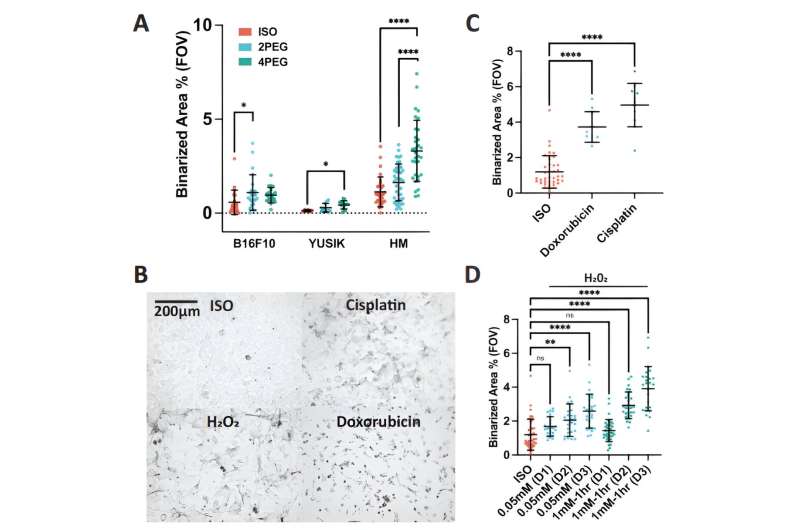This article has been reviewed according to Science X's editorial process and policies. Editors have highlighted the following attributes while ensuring the content's credibility:
fact-checked
peer-reviewed publication
trusted source
proofread
Compression of cancer cells is a double-edged sword, study finds

Adhering closely to Darwin's theory of evolution, tumors need to adapt to environmental changes to survive. A new study shows that one of those changes—the compression of cells—can both help and hinder the progression of cancer.
The study, which looks specifically at melanoma cells, is published in the Proceedings of the National Academy of Sciences (PNAS) and was conducted in the lab of Michael Mak, assistant professor of biomedical engineering. Xingjian Zhang, a former Ph.D. student in Mak's lab, is first author of the study.
As a tumor develops, melanoma cells may experience a range of environmental challenges that prompt adaptations. One of these challenges is the compression of tumor cells, which causes changes in the tumor itself.
It happens when tumor cells proliferate in constrained tissue environments. It also occurs during tumor progression and metastasis, when cancer cells can migrate in confined microenvironments, causing the cells to deform and sometimes decrease in volume. And in certain cancers, walking and other everyday activities can lead to compression of the cells.
The effects of compression on cancer cells, though, hasn't been well explored, and it's unclear how these physical forces impact and drive the diverse properties found in tumors. Using a bioinformatics-informed approach, Mak and his research team found that compression-induced changes on melanoma cells are associated with both the improvement and worsening of patient prognoses.
On the one hand, compression inhibits the proliferation and migration of melanoma cells, thereby suppressing tumor progression. Compressions also trigger subcellular activities that contribute to elevated intracellular organelle stress and oxidative stress, which can potentially damage cells and affect their viability and function.
On the other hand, compression drives adaptations to stress and changes in the transcriptome, leading to properties that include the ability to resist chemotherapeutic treatment.
"Surprisingly, compression-conditioning of cancer cells for only a few days can promote resistance to chemotherapeutic treatment," said Mak, who is also a Yale Cancer Center member.
The researchers said these findings could be useful in developing new treatments for cancer.
"They offer valuable insights into therapeutic strategies aimed at addressing cancer chemoresistance and improving chemotherapy outcomes for cancer patients," Zhang said.
The researchers said they plan to explore the effects of different types of compression over varying time scales.
More information: Xingjian Zhang et al, Compression drives diverse transcriptomic and phenotypic adaptations in melanoma, Proceedings of the National Academy of Sciences (2023). DOI: 10.1073/pnas.2220062120



















